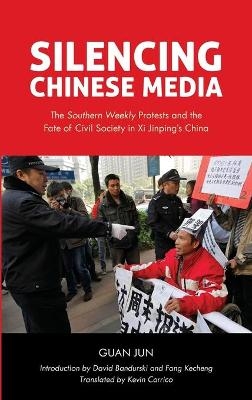
Silencing Chinese Media
The "Southern Weekly" Protests and the Fate of Civil Society in Xi Jinping's China
Seiten
2020
Rowman & Littlefield (Verlag)
978-1-5381-4226-4 (ISBN)
Rowman & Littlefield (Verlag)
978-1-5381-4226-4 (ISBN)
This gripping insider’s account highlights the internal debates and public protests at the Southern Weekly, a newspaper known for pushing the envelope on media controls. In his first-person account of a seminal moment as Xi Jinping tightened his grip, Guan Jin provides an ominous warning on the path ahead for Chinese media and civil society.
Chinese media in the reform era walk a fine line between commercialized diversification and Party-state control. Nowhere have these two trends been in more open conflict than at Southern Weekly (Nanfang Zhoumo), a bestselling Guangzhou-based newspaper known for reliably pushing the envelope on media controls. This gripping insider’s account highlights the fiery internal debates and public protests at the paper at the beginning of Xi Jinping’s reign. In early 2013, disagreements with censors over draconian cuts to the paper’s New Year’s edition grew into a lengthy internal discussion about how to push back against the Party’s ever-tightening constraints. At the same time, a parallel movement emerged among activists protesting outside the paper’s Guangzhou’s headquarters to publicly show their opposition to Party control over the media. Nothing, however, changed, as Party-state controls remained firmly in place. Guan Jun offers thoughtful reflections on the tensions inherent within the Chinese government’s program of “reform and opening,” in the new era of tightening authoritarianism under Xi Jinping. The End of Chinese Media, as a first-person account of a seminal cultural and political moment early in, provides an ominous warning on the path ahead for Chinese media and civil society.
Chinese media in the reform era walk a fine line between commercialized diversification and Party-state control. Nowhere have these two trends been in more open conflict than at Southern Weekly (Nanfang Zhoumo), a bestselling Guangzhou-based newspaper known for reliably pushing the envelope on media controls. This gripping insider’s account highlights the fiery internal debates and public protests at the paper at the beginning of Xi Jinping’s reign. In early 2013, disagreements with censors over draconian cuts to the paper’s New Year’s edition grew into a lengthy internal discussion about how to push back against the Party’s ever-tightening constraints. At the same time, a parallel movement emerged among activists protesting outside the paper’s Guangzhou’s headquarters to publicly show their opposition to Party control over the media. Nothing, however, changed, as Party-state controls remained firmly in place. Guan Jun offers thoughtful reflections on the tensions inherent within the Chinese government’s program of “reform and opening,” in the new era of tightening authoritarianism under Xi Jinping. The End of Chinese Media, as a first-person account of a seminal cultural and political moment early in, provides an ominous warning on the path ahead for Chinese media and civil society.
Guan Jun is a former Southern Weekly journalist and author. Kevin Carrico is senior lecturer in Chinese studies at Monash University.
| Erscheinungsdatum | 10.05.2021 |
|---|---|
| Einführung | David Bandurski, Fang Kecheng |
| Übersetzer | Kevin Carrico |
| Verlagsort | Lanham, MD |
| Sprache | englisch |
| Maße | 160 x 228 mm |
| Gewicht | 458 g |
| Themenwelt | Geisteswissenschaften ► Geschichte ► Regional- / Ländergeschichte |
| Sozialwissenschaften ► Kommunikation / Medien ► Journalistik | |
| ISBN-10 | 1-5381-4226-0 / 1538142260 |
| ISBN-13 | 978-1-5381-4226-4 / 9781538142264 |
| Zustand | Neuware |
| Haben Sie eine Frage zum Produkt? |
Mehr entdecken
aus dem Bereich
aus dem Bereich
Erinnerungen
Buch | Softcover (2024)
Pantheon (Verlag)
16,00 €
Universalgelehrter, Polarreisender, Entdecker
Buch | Hardcover (2024)
mareverlag
28,00 €


